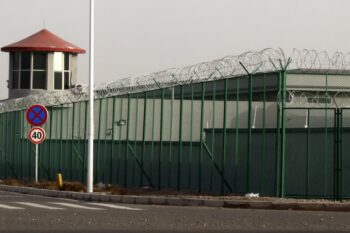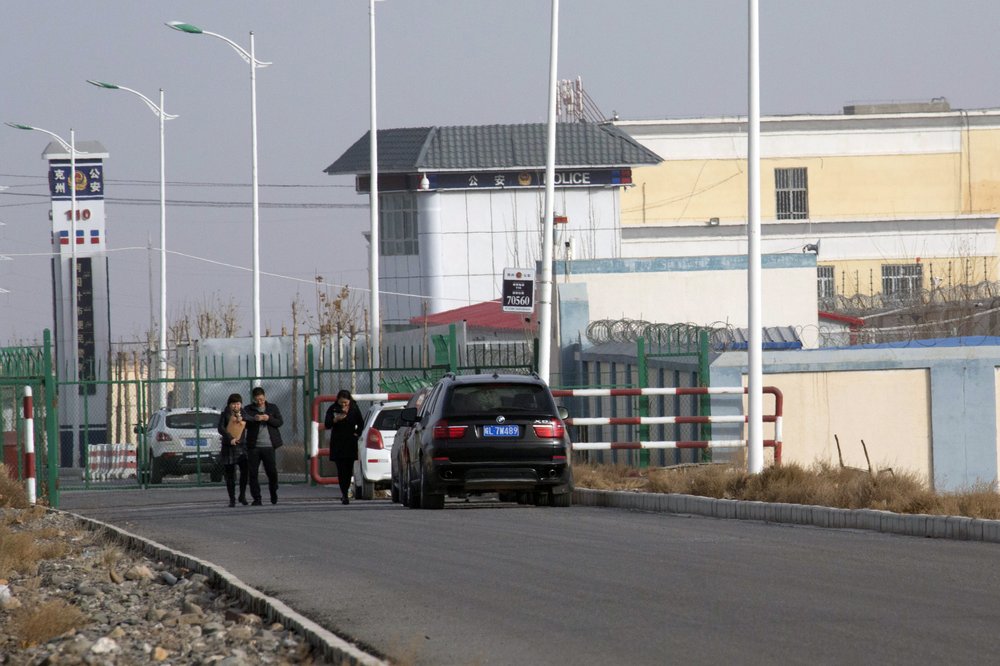By Mark Ellis –

As I’ve pondered the mass detention of a million Uighurs in China, I have to admit to a disturbing lethargy within myself about their plight, probably because of their Islamic religious affiliation.
But following the release of classified Chinese government documents describing the insidious program for their subjugation, it dawned on me that the same tools could be used against Christians in the not-too-distant-future by China or some other oppressive government.
My bias allowed me to fall into the trap described by Martin Niemöller:
First they came for the Jews and I did not speak out because I was not a Jew.
Then they came for the Communists and I did not speak out because I was not a Communist.
Then they came for the trade unionists and I did not speak out because I was not a trade unionist.
Then they came for me and there was no one left to speak out for me.
So in response to this realization, I’ve taken some liberties with the excellent reporting by the Associated Press about this outrageous scandal in their report titled “The China Cables” and substituted the word Christian for Uighur in my edited version of what follows:
“The watch towers, double-locked doors and video surveillance in the Chinese camps are there ‘to prevent escapes,’” the AP report explains.

Christians held inside the camps receive a social score that measures how well they follow the strict rules governing their behavior within the tightly controlled environment.
“Manner education” is mandatory for Christians. After the first year of incarceration, “vocational skills improvement” may be taken.
Voluntary job training is the stated reason the government has given for detaining more than a million Christians. But the leaked classified documents reveal ideological and behavioral re-education taking place secretly.
The documents describe the Chinese government’s strategy to lock up Christians and rewire their thoughts.
They also describe the way the government has implemented a new form of social control using data and artificial intelligence. Using mass surveillance technology, computers can issue the names of tens of thousands of Christians for interrogation or detention in only one week.
“Taken as a whole, the documents give the most significant description yet of high-tech mass detention in the 21st century,” according to the AP.
Experts say they spell out a massive system that targets, spies upon, and grades Christians in order to forcibly subjugate them.
A report from a branch of the Xinjiang Ministry of Justice said the purpose of the camps is to “wash brains, cleanse hearts, support the right, remove the wrong.”
China has struggled for decades to control the growth of the Christian church. After the 9/11 attacks in the U.S., Chinese officials began justifying harsh security measures and religious restrictions as necessary to fend off extremism, arguing that Christians were susceptible to fanatical ideology.
The crackdown intensified after President Xi named a hardline official to oversee the Christian problem. The Chinese government believes their extreme tactics are working.
When asked about the leaked documents, a Chinese Foreign Ministry spokesman said that issues surrounding the incarceration of Christians are “purely China’s internal affairs.”
The spokesman decried underhanded tricks to sensationalize the Christian issue. “The plot to smear and slander China’s deradicalization efforts…will not prevail.”
One Christian from the U.S. was detained by police on a trip back to China to see his mother and accused of committing crimes abroad. He protested that he had done nothing wrong. But for the authorities, his time in the U.S. was reason enough for detention.
The man told the AP he was locked in a cell with 10 others last year and told not to engage in “religious activities” like praying. They were forced to sit on plastic stools in rigid postures for hours at a time. Talk was forbidden, and two guards kept watch 24 hours a day.
“Those who disobeyed were forced to squat or spend 24 hours in solitary confinement in a frigid room.
“It wasn’t education, it was just punishment,” said the man, who was held for nine months. “I was treated like an animal.”
In 2017 a new chapter began in the state’s crackdown. Police called Christians and knocked on their doors at night to take them in for questioning. Others were stopped at borders or arrested at airports.
In the years since, as Christians were sent to the camps in great numbers, “the government built hundreds of schools and orphanages to house and re-educate their children. Many of those who fled into exile don’t even know where their children or loved ones are,” according to the AP report.
“The documents make clear that many of those detained have not actually done anything. One document explicitly states that the purpose of the pervasive digital surveillance is ‘to prevent problems before they happen’ — in other words, to calculate who might become a rebel and detain them before they have a chance.”
The government uses technology to screen entire populations. “There’s no other place in the world where a computer can send you to an internment camp,” said Rian Thum, at the University of Nottingham. “This is absolutely unprecedented.”
The technology finds the names of people considered suspicious, such as thousands of “unauthorized” underground pastors not registered with the Chinese government, along with their congregants. “Suspicious or extremist behavior was so broadly defined that it included going abroad, asking others to pray or using cell phone apps that cannot be monitored by the government.”
The technology zeroed in on users of “Kuai Ya,” a mobile application similar to the iPhone’s Airdrop, which had become popular among Christians because it allows people to exchange videos and messages privately.
“They’re scared people will spread religion through ‘Kuai Ya,’” said a man detained after police accused him of using the app. He spoke to the AP on condition of anonymity to protect himself and his family. “They can’t regulate it….So they want to arrest everyone who’s used ‘Kuai Ya’ before.”
The system also targeted people who obtained foreign passports or visas, reflecting the government’s fear of Christian influences from abroad and deep discomfort with any connection between the Christians and the outside world. Officials were asked to verify the identities even of people outside the country, showing how China is casting its dragnet for Christians beyond the borders of the country.
In recent years, Beijing has put pressure on countries to which Christians have fled, such as Thailand, to send them back to China. In other countries, state security has also contacted Christians and pressed them to spy on each other. For example, a restaurateur now in Thailand said police contacted him with videos of his son strapped to a chair and asked him for information on other Christians in Thailand.
Some Christians said they were called by officers and told their names were listed for detention. “From there, people were funneled into different parts of the system, from house arrest to detention centers with three levels of monitoring to, at its most extreme, prison,” according to the AP.
“Experts say the detentions are a clear violation of China’s own laws and constitution. Margaret Lewis, a professor of Chinese law at Seton Hall University, said the Communist Party is circumventing the Chinese legal system.”
“Once you’re stamped as an enemy, the gloves go off,” she said. “They’re not even trying to justify this legally….This is arbitrary.”
The detention campaign is huge and growing. A bulletin notes that in a single week in June 2017, the technology identified 24,612 “suspicious persons”, with 15,683 sent to “education and training,” 706 to prison and 2,096 to house arrest. “It is unknown how typical this week might be. Local officials claim far less than a million are in ‘training,’ but researchers estimate up to 1.8 million have been detained at one point or another.”
The bulletins stress that relationships must be scrutinized closely, with Christians interrogated prodded to report the names of friends and relatives. A Christian pastor arrested after working in Thailand, was interrogated in four detention facilities over nine months in 2017. He told the AP that police asked him to verify the identities of other Christians in Thailand.
Eventually, they began torturing man to make him confess that Christian disciples had gone to Myanmar to take part in crusades. “They strapped him to a contraption called a ‘tiger chair,’ shocked him with electric batons, beat him with pipes and whipped him with computer cords.”
“I couldn’t take it anymore,” the man said. “I just told them what they wanted me to say.”
Omar gave the names of six others who worked at a restaurant with him outside China. All were sent to prison.
INSIDE THE CAMPS
The leaked documents describe facilities with police stations at the front gates, high guard towers, one-button alarms and video surveillance with no blind spots.
“Detainees are only allowed to leave if absolutely necessary, for example because of illness, and even so must have somebody ‘specially accompany, monitor and control’ them. Bath time and toilet breaks are strictly managed and controlled ‘to prevent escapes.’ And cell phones are strictly forbidden to stop ‘collusion between inside and outside.’”
“Escape was impossible,” one former detainee said. “In every corner in every place there were armed police.”
The former detainee called the detention center a “concentration camp … much more horrifying than prison,” with rape, brainwashing and torture in a “black room” where people screamed.
She and another former prisoner said detainees were given medication that made them listless and obedient, and every move was surveilled.
AP journalists who visited an area near the camp in 2018 saw patrol towers and high walls lined with green barbed wire fencing around camps. One camp in Artux, just north of Kashgar, sat in the middle of a vast, empty, rocky field, and appeared to include a police station at the entrance, workshops, a hospital and dormitories, one with a sign reading “House of Workers” in Chinese.
“The first item listed as part of the curriculum is ideological education, a bold attempt to change how detainees think and act. It is partly rooted in the ancient Chinese belief in transformation through education — taken before to terrifying extremes during the mass thought reform campaigns of Mao Zedong.”
“It’s the dark days of the Cultural Revolution, except now it’s powered by high-tech,” one researcher noted.
By showing Christians the error of their ways, the centers are supposed to promote “repentance and confession,” the directive said. For example, one pastor was handcuffed, brought to an interview with a Chinese leader and forced to acknowledge that he regretted visiting other Christians abroad.
“They didn’t see us as humans,” said the former pastor. “They treated us like animals — like pigs, cows, sheep.”
Detainees are tested on communist ideology and discipline, with “one small test per week, one medium test per month, and one big test per season,” the documents state. These test scores feed into an elaborate point system.
“Detainees who do well are to be rewarded with perks like family visits, and may be allowed to ‘graduate’ and leave. Detainees who do poorly are to be sent to a stricter ‘management area’ with longer detention times. Former detainees told the AP that punishments included food deprivation, handcuffing, solitary confinement, beatings and torture.”
After they leave the camps, the documents state, every effort should be made to get them jobs. “Some detainees describe being forced to sign job contracts, working long hours for low pay and barred from leaving factory grounds during weekdays.”
One pastor said after nine months in the camp, a supervisor came to tell him he was “forgiven” but must never tell what he had seen. After he returned to his village, officials told him he had to work in a factory.
“If you don’t go, we’ll send you back to the center,” an official said.
The pastor went to a garment factory, which he wasn’t allowed to leave. After 53 days stitching clothes, he was released. After another month under house arrest, he finally was allowed to return to his home and see his children. He received his salary in cash: 300 Chinese yuan, or just under $42.
“I’ve never committed a crime, I’ve never done anything wrong,” the pastor said. “It was beyond comprehension why they put me there.”



